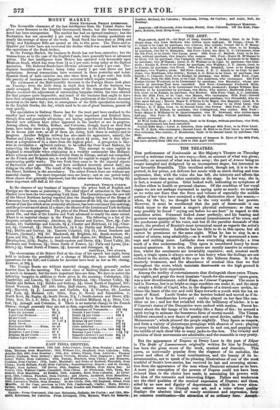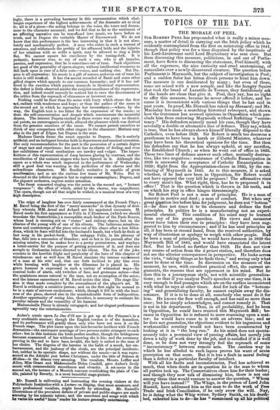But the appearance of Duprez at Drury Lane in the
part of Edgar in The Bride of Lammermoor, originally written for him by Doniz.etti, has been the great event of the week, musical and dramatic. This opera, so universally popular from the elegance of its melodies, the power and effect of its vocal combinations, and the beauty of its in- strumentation, not to speak of its pleasing illustrations of one of the most truthful of Scott's love-stories, has received its last and crowning attrac- tion from the appearance of the man whom Donizetti selected as its hero. A more just conception of the powers of Duprez could not have been evinced than in the choice here made, in associating his powers with the idea of the romantic and interesting Edgar. Pathos and tenderness are the chief qualities of the musical expression of Duprez; and these, aided by an ease and dignity of deportment in which in every situa- tion nature seems to triumph over art, and a voice whose quality displays the absolute ideal of manly sentiment and expression, form no common combuation---the attraction of no ordinary hero. Accord- ingly, there is a pervading harmony in this representation which chal- lenges experience of the highest achievements of the dramatic art to rival it: all is of a piece—the acting belongs to the voice the tones and demea- nour to the character assumed; and we feel that as isx as the sentiment of an affecting narrative can be transfused into music, we have before us truth, and in Duprez the veritable Master of Ravenswood. We do not know that this performance is the less interesting in that it is not abso- lutely and mechanically perfect. A man who exists in such a torrent of emotions, and withstands the perfidy of Isis affianced bride and the injuries of her relations with so noble a spirit, may be allowed to sing a little fiat. We cannot square his excellence by the tuning-fork. It is pedantic' however true, to say of such a one, who is all impulse, passion and expression, that he is sometimes out of tune. Such objections are good of the generality of opera-singers, without intellectual resources to fall back upon in case of a false note—voices, and nothing else. But Du- prez is all expression: his music is a gift of nature, and even out of tune his -voice is still musical. It has the accent recorded of Banti and some other gifted singers which appeals to our common humanity; and if it has suf- fered in the exertion which passion demands in theatrical representation, the defect is little observed amidst the conjoint excellence of the representa- tion, and indeed would scarcely be noticed but to save the discernment of the critics from the reproach of obtuseness or incorrect ear. Nothing could be finer than his scene with Lucy which closes the first set, radiant with tenderness and hope; or than the pathos of the scene in the second act in which he reproaches her inconstancy,—where, by the way, the English text is too bitter for the expression of the music; or than the self-concentration and despair which consummate the mournful drama. The interest Duprez excited in these scenes was pure: no theatri- cal points, no extravagance or trick, alloyed the pleasure which was derived from the genuine emotions of the scene. We cannot permit ourselves to think of any comparison with other singers in the character: Moriani may ring in the part of Edgar, but Dnprez is the man.
Madame Garcia forms the exact opposite to Duprez. She is entirely artificial, and 'an inelegant heroine both in deportment and musical execution. Her only recommendation for the part is the possession of a certain degree of stage tact and experience: her music has no charm of feeling, and even her exhibitions of vocal mechanism are tawdry and vulgar. The imper- fections of this representation of Lucy become glaring by contrast, and the recollection of the eminent singers who have figured in it. Although the opera as a whole was much improved in the performance of Wednesday, still a good deal was wanting in the perfection of the chorus and the -subordinate characters. Mr. Burdix' d's recitative is capable of great -amelioration; and so are the curious low tones of Mr. Weiss. But to descend to the inferior singers is but to register commonplace; Duprez, and the piquant orchestra, engross entire attention.
The finest concerted singing was the sestet in the second act, "Instant vengeance ": the effect of which, aided by the chorus, was magnificent. The opera, though not all that might be wished, is a musical treat of a very high description. -



























 Previous page
Previous page